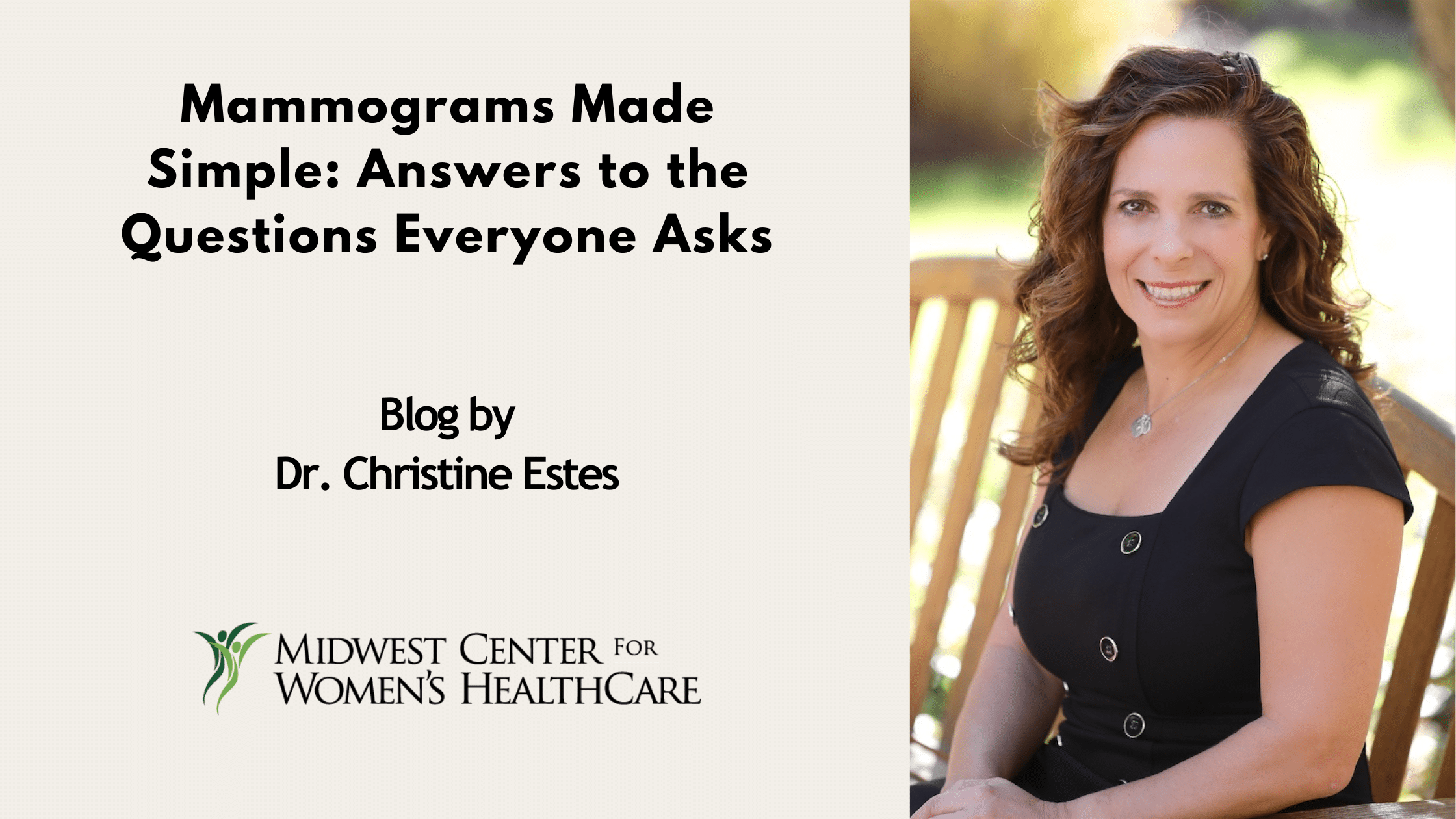The conventional wisdom for Hormone Replacement Therapy (HRT) has swung dramatically over the past several decades. For a long time, it was seen as the fountain of youth – almost a supplement rather than a medication – something that every woman should be on to stay healthy. Then came the Women’s Health Initiative in 2002, which showed an increase risk in breast cancer and cardiovascular disease. Millions of women stopped hormone replacement or were reluctant to start, some of whom then experienced severe menopausal symptoms like hot flashes, night sweats and mood changes. Over the ensuing years our philosophy has settled into one of moderation: Treat each woman and her symptoms as safely as we can. For some, hormone replacement therapy is a needed balm to menopausal suffering, for others the small risks are not worth it, or their minimal symptoms don’t require medications. Your doctors with Midwest Center for Women’s HealthCare can help you find your way through this sometimes-confusing topic.

What is HRT?
Hormone Replacement Therapy or HRT is using estrogen (usually in combination with a progestin) to mitigate unpleasant symptoms of menopause. As we pass our reproductive years, women’s ovaries stop making estrogen and progesterone, and menstrual periods stop. The average age of menopause is 51, plus or minus 5 years; menopause is defined as twelve months without a menstrual period. In the years leading up to meeting this definition, and in the years that follow, some women will experience a combination of hot flashes, night sweats (“vasomotor symptoms”) sleep disturbance, and mood changes. For many women, these symptoms are short lived, mild annoyances. For others, they are extremely disruptive to their daily functioning and can last for years.
HRT can help to ease these symptoms. Women’s hormone levels naturally drop as we transition to menopause. Think of HRT as a way to slowly reduce your hormonal levels, taking a gentle escalator down in dosing over time, instead of jumping off a cliff.
Estrogen Alone, or With Progestin?
Estrogens (typically estradiol or conjugated estrogens) are the key component to reducing menopausal symptoms. You can take estrogen alone if you have had a hysterectomy.
Progestins (micronized progesterone, norethindrone, drosperinone, levonorgestrel) are needed to balance the effects of estrogen on the lining of your uterus. Without the balance of a progestin, estrogen alone will stimulate growth in the endometrium (uterine lining) and can lead to cancers or precancers. To prevent such harm, women can take progestins daily, for two weeks each month, or occasionally for two weeks each quarter to bring such a balance.
How Can HRT Help Me?
HRT can help ease or resolve many of the symptom of menopause, including hot flashes, night sweats, sleep disturbances, mood changes and vaginal dryness. It also prevents the bone loss traditionally associated with menopause, stalling development of osteopenia or osteoporosis. Lastly it may decrease one’s risk of cardiovascular disease, but the evidence is not clear.
What are the Risks of HRT?
We know that estrogens increase your blood’s potential for clots. Thus, all forms of HRT increase your likelihood of a blood clot in your leg veins that can go to your lungs. Interestingly, the other known risks vary significantly depending on whether you also need a progestin (as above, if you’ve had a hysterectomy, you can take just estrogen alone). We know that if a combination of estrogen and progestin is taken for more than 5 years, HRT increases your lifetime risk of breast cancer. This is not true of estrogen alone. The data is mixed on causality of heart disease and stroke, although if you already have known risk factors such as diabetes, obesity, high cholesterol or hypertension, your doctors may try other non-hormonal treatments for menopause first. Lastly there may be a link between long term use of HRT and dementia.
What does Bioidentical Mean?
“Bioidentical” refers to hormones that are prescribed in the same composition that they are available in within the body. Estradiol is the form of estrogen that fits that description, and micronized progesterone is the progestin type. Rest assured that if this distinction is important to you, your MCWHC OB/GYN can prescribe these specific hormones for you in an FDA approved fashion, available from your pharmacy like any other medication. While you can have special preparations made by a compounding pharmacy, one can certainly get a “bioidentical” formulation from a conventional pharmacy and prescription.
It is not necessary or better to have a “bioidentical” formulation, but they are available.
How Can I Take HRT?
- Pills: There are many pills that are available with either estrogen only or a ready-made combination of estrogens and progestin.
- Patches: You can use a small patch, changed weekly or twice weekly, to deliver either estrogen only, or a combination of estradiol and a progestin. Some women wish to use an estradiol patch and then take oral progesterone.
- Gels and Sprays: Multiple products exist to deliver estradiol through a spray or gel. If one also needed a progestin, women take a separate pill. Delivering the estrogens via the skin lowers the risk of blood clots and possibly then of cardiovascular disease, which is why many women chose a patch, spray, or gel.
- Pellets: Pellet tablets inserted under the skin by a physician that are slowly absorbed over 3-6 months. Their doses are hard to control and once placed cannot be retrieved. Most physicians do not recommend them.
- Vaginal Preparations: Vaginal estrogen products, used alone or in combination with other methods, are a way to combat menopausal vaginal dryness. Creams, gel tabs, tablets, rings and suppositories can all be used to locally treat dryness with minimal systemic absorption. This is a great method for women who primarily have vaginal dryness or pain with intercourse but who can’t or don’t want to use other systemic methods (pills, patches, gels, etc).
Don’t You Need to Test My Hormones?
Not really. Elaborate and expensive blood panels for “hormones” are sometimes promoted by practitioners as a way to determine what medications or doses they will recommend. However, if you are having symptoms of menopause, we naturally assume your estrogen levels, for example, will be low. We don’t need blood work for that. Treating your specific symptoms, not numbers on a page, are what is most important to your MCWHC physicians. There may be other conditions we will screen for as a matter of course, but if you choose hormone therapy, your dose will be titrated to relieve your symptoms.
How Long Should I Take HRT?
Just like starting HRT is a personal discussion with your physician, so is tapering or stopping it. We know that your risk of breast cancer, for example, starts to go up at the 5-year mark. Each year on HRT, your MCWHC practitioner will review your specific risks and benefits, how you are feeling on your medications and any new medical conditions that have arisen, and together with you, decide how to proceed in the coming year. Some women choose to continue for many years. Others decide to slowly taper their doses and eventually stop. If between visits you are diagnosed with breast cancer, have a blood clot in your leg or lung, develop heart disease or have a stroke, please contact your OB/GYN to have a discussion about your HRT use as soon as possible.
What are Other Options if I Don’t Want to Take HRT?
While nothing works for symptoms of menopause quite like hormones, there are an array of non-hormonal treatments. Over the counter “nutriceuticals” or nutritional supplements with vague health claims that contain black cohosh reduce hot flashes better than a placebo. SSRIs (selective serotonin reuptake inhibitors, commonly used as antidepressants) such as paxil (paroxetine), effexor (venlafaxine), or lexapro (escitalopram) have also been shown to reduce hot flashes and stabilize the common mood changes of menopause. Lastly, evaluation and treatment of sleep disorders can help tremendously.
You have a lot of safe options for menopausal symptoms, including but not limited to hormone replacement therapy. Your doctors at Midwest Center for Women’s HealthCare are ready to discuss your specific needs.
About The Author
Cheryl Axelrod, M.D., F.A.C.O.G
Cheryl Axelrod, M.D., F.A.C.O.G. is board-certified Obstetrics and Gynecology physician who provides comprehensive gynecological services and obstetrical care to patients. She earned her medical degree from the Johns Hopkins University School of Medicine and completed her residency at The University of Chicago Hospitals. One day a week, Dr. Axelrod teaches and supervises medical students and residents directly in labor and delivery at Evanston Hospital.
Dr. Axelrod advocates for her patients in and out of the office. She is an active participant in local and national politics, working with groups such as NARAL, Planned Parenthood, and Doctors for Camp Closure. She and her husband (who also makes “good trouble”) live in Wilmette with their son. She’s also a proud bonus mom to her college age stepdaughter.
Dr. Axelrod sees patients in our Skokie offices and delivers babies and performs procedures at NorthShore University Evanston Hospital. She is currently accepting new patients by calling 847.499.2648 or requesting an appointment here. Learn more about Dr. Axelrod here.




